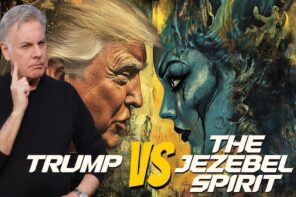Fundamentalist Christian support for President Trump is a commonly known, if poorly understood, political dynamic in the United States today. That support sometimes takes surprising shape to outsiders—as when, last year, President Trump’s spiritual adviser Paula White strode the White House grounds, exorcising the demonic opponents of the President. Dedicating the White House as “holy ground […] by the superior blood of Jesus,” White “released angels and the Holy Spirit and walls of fire” in order to “burn up every demonic altar” and “renounce every demonic spirit” and “every covenant made with Satan.”
Televangelist Paula White, a key spiritual adviser to President Trump, brags of using her access to the White House to declare it "holy ground" that is sanctified by "the superior blood of Jesus." https://t.co/dwBFs2MCe8 pic.twitter.com/zz804kbY09
— Right Wing Watch (@RightWingWatch) September 11, 2019
Like some other fundamentalist supporters, White later attributed the President’s impeachment to “demonic schemes” and “demonic stirrings and manipulations”—literally demonizing the President’s political opposition. What was going on?
Tonight we lift up our President, @realDonaldTrump in prayer against all wickedness & demonic schemes against him and his purpose in the name of Jesus. Surround him with your angels and let them encamp around about him. Let all demonic stirrings and manipulations be overturned!
— Paula White-Cain (@Paula_White) December 19, 2019
Readers of fundamentalist fiction knew what was going on. In Frank Peretti’s This Present Darkness, a small all-American town becomes the epicenter of an international conspiracy to purchase the town’s local college. The conspiracy is opposed by the town’s fundamentalist Christians, who are the only ones who understand that the machinations that seem to join psychology professors, New Age gurus, and liberal (non-fundamentalist) ‘Christians’, are actually the work of demons operating at Satan’s behest.
Like Paula White striding the White House grounds, the fundamentalist preacher protagonist of the novel walks through the town, combating demons through prayerful “spiritual warfare.” And like Paula White, the novel’s good characters come to realize that what lies behind their human political opponents are actually “demonic schemes” to oppress and eliminate God’s followers.
Why should we read Christian fundamentalist fiction? Think of novels as a kind of technology—a technology that allows the reader access to the imaginative and emotional experiences of the novel’s characters. Reading fundamentalist fiction allows us to understand the worldview of the most politically consequential demographic in the United States today.
White evangelical Christians wield their disproportionate political power via their domination in the Republican Party, and 81% of them voted for Donald Trump in 2016. They remain his core group of support, standing behind him during his impeachment, and they are a key to his re-election bid in 2020.
The evangelical scholar Mark Noll has criticized the lack of “serious intellectual life” within his American evangelical tradition, calling it “the scandal of the evangelical mind.” Evangelical fiction gives outsiders access to this scandal of the evangelical mind, illustrating its frequently simplistic and reactionary epistemology, ethics, and politics. The fiction helps us understand the evangelical apocalyptic worldview—and how it has helped bring the country to its current twinned epistemological and constitutional crises.
These novels sometimes have gigantic readerships, like the well known Left Behind series by Tim LaHaye and Jerry Jenkins which tells the story of the apocalyptic End Times and the rise of the Antichrist, who becomes Secretary General of the United Nations. The series has sold 63 million copies, and has spun off films, computer games, and children’s books. The reach and influence of evangelical fiction can be far greater than most ‘serious’ literary fiction concerned with religious issues—even the work of the beloved Marilynne Robinson.

Screen shot from Hulu’s “The Handmaid’s Tale.”
I’ve just edited a special issue of the academic journal Christianity & Literature devoted to “Literature of / about the Christian Right.” The issue’s authors are trying to get a handle on fundamentalist fiction, but also fiction by outsiders that’s about fundamentalist Christianity—think Margaret Atwood’s The Handmaid’s Tale as the best known example.
Through this double lens, we’re trying to understand the way that evangelical identity and knowledge circulates through storytelling—as with all other human groups. Like other humans, evangelical Christians don’t get their knowledge primarily through fact sheets or decontextualized data, but rather through the power of narrative; by telling stories about who they are and what they should believe about God, America, and the world.
In our special issue, for instance, Andrew Connolly analyzes Peretti’s gender politics, showing that his fiction trains its male readers to understand themselves as engaged in spiritual warfare against “progressive politicians, liberal education, psychology, pro-choice activists, and the media.” Fundamentalist fiction, in other words, helps to tell stories about proper Christian understandings of gender and sexuality, politics, and the world of the spirit.
This is apparent in a second article, by Maggi Kamitsuka, on evangelical romance fiction by Francine Rivers. In her bestselling novel The Atonement Child, a young woman faces the difficult choice of whether to terminate her pregnancy after rape—but the novel circulates the medically incorrect idea that experiencing an abortion is more traumatic than experiencing rape, an idea commonly found in the new evangelical “compassion-oriented” prolife discourse. Novels like The Atonement Child circulate medical “knowledge,” part of the worldview that makes evangelicals so supportive of President Trump’s Supreme Court picks.
Evangelicals have particular ways of reading, often based in their understanding of the Bible. Ken Paradis looks at the use of “typology”—the way of understanding a character’s or reader’s life as previously modelled (and even predicted) by a story in the Bible. What distinguishes fundamentalist fiction from literary fiction, Hal Bush argues in another article, is its drive for “epistemological certainty,” as opposed to an openness to mystery, doubt and ambiguity of the kind that we find in ‘serious’ literature on religious topics.
The Bible itself—its authority, its aura, its status as God’s word, without errors—is sometimes a focus of the fiction. In another article, Andrew Jacobs examines the strange sub-genre known as the “gospel thriller”—in which the discovery of a new first-century gospel about Jesus seems to threaten the Bible’s sacred power. This genre was invented by an evangelical author, whose novel featured a purported lost gospel that turned out to be a nefarious forgery intended to subvert Christianity—but the gospel thriller has many secular descendants. Other authors, including Susan Harding and Ray Horton, ponder how we should read fundamentalist fictions, fictions by fundamentalist authors, or about fundamentalism itself.
The point of paying attention to literature by Christian Right authors is it helps us better understand what’s going on in America today. In his Memoir Crazy for God, apostate ex-evangelical and former leader of the Christian Right, Frank Schaeffer, who helped politically activate a generation of previously moderate evangelicals in the late 1970s, wrote about the consequences of not paying any heed to the literary arm of this new social movement:
The [New York] Times ‘best-seller’ list was misleading. Evangelical books were often outselling the Times’ best-sellers. But the paper did not bother to count sales in religious bookstores. The people hurt most weren’t evangelical authors (our books sold anyway); rather, the losers were Democratic Party leaders and other liberal readers of the ‘paper of record’ who were blindsided by subsequent events. The Times’ readers were not given a heads-up about what was going on ‘out there.’
This call to pay attention to “literature of / about the Christian Right” can be uncomfortable for some, hitting too close to home and striking some as too political. When my book If God Meant to Interfere: American Literature and the Rise of the Christian Right was reviewed by one conservative Christian English professor, he complained that I “blamed” the Christian Right “(with scant justification) for all manner of America’s ills.” He went on to say that my “literary analysis rests on firmer footing than [my] political commentary.”
In other words, stick to literary criticism, and keep out of politics. Between writing the review and its release, however, white evangelicals helped elect Donald Trump. Obviously, we cannot afford to stay out of politics when addressing fundamentalist fiction. But that Christian reviewer’s anxiety—which was not shared by other less anxiously conservative Christian reviewers—speaks to the way in which some Christians do not want to grapple with the politics involved in religion.
For some “exvangelicals” who have emptied the pews, particularly if they’ve had a traumatic experience, it’s too much to ask that they revisit their “left behind” church beliefs, albeit in fictional form. I have in mind rather the “nones” of America, as well as mainline Protestants and members of other faiths, who probably haven’t really had the opportunity to imagine what it’s like to be in evangelical shoes.
Our reading mode can be empathetic but critical: it’s worth understanding the shape and power of evangelicals’ feeling that they are a besieged minority in an aggressively secular state—and even that their Democratic, secular, or progressive political foes are being manipulated by actual demons, as This Present Darkness and Paula White suggest.
Fundamentalist fictions can be understood to be part of the vast alternate information ecosystem that white evangelicals have built over the last century. Fundamentalist fictions are published by Christian publishers and sold in Christian bookstores (and elsewhere), part of the network of Christian fundamentalist institutions—Bible colleges and universities, newspapers and magazines, radio and television shows, museums and campus ministries—that together work to resist elite, secular expert knowledge. Their stories help constitute evangelical knowledge and political identity, and we can read them empathetically to understand the worldview of their target audience—even as we realize that those readers constitute the core base of support for the most corrupt, deceitful, cynical, authoritarian presidency in American history. We should read fundamentalist fictions with care.
***
Read an interview with the author about the special issue: here
Read the author’s introduction to the special issue: here





